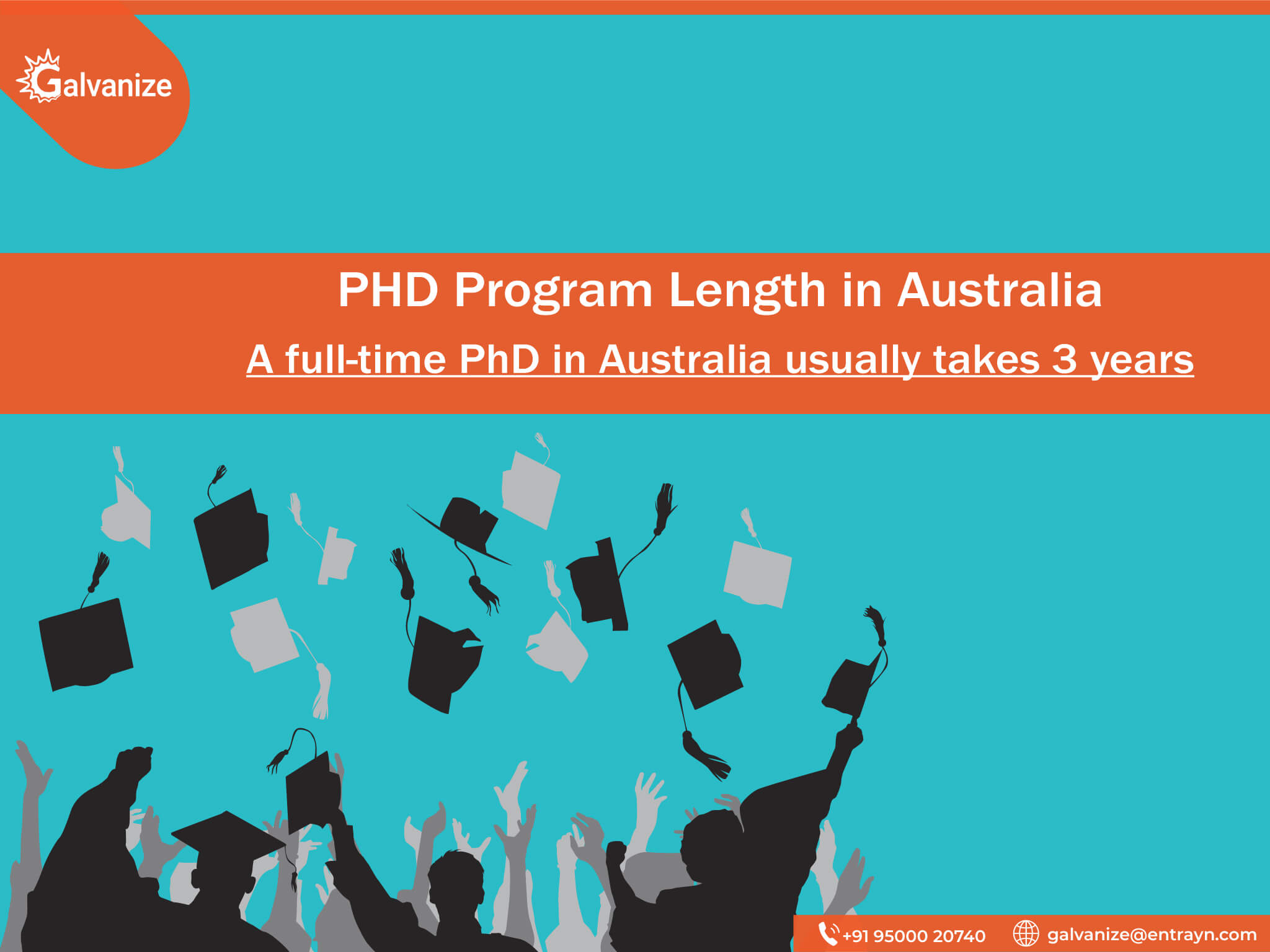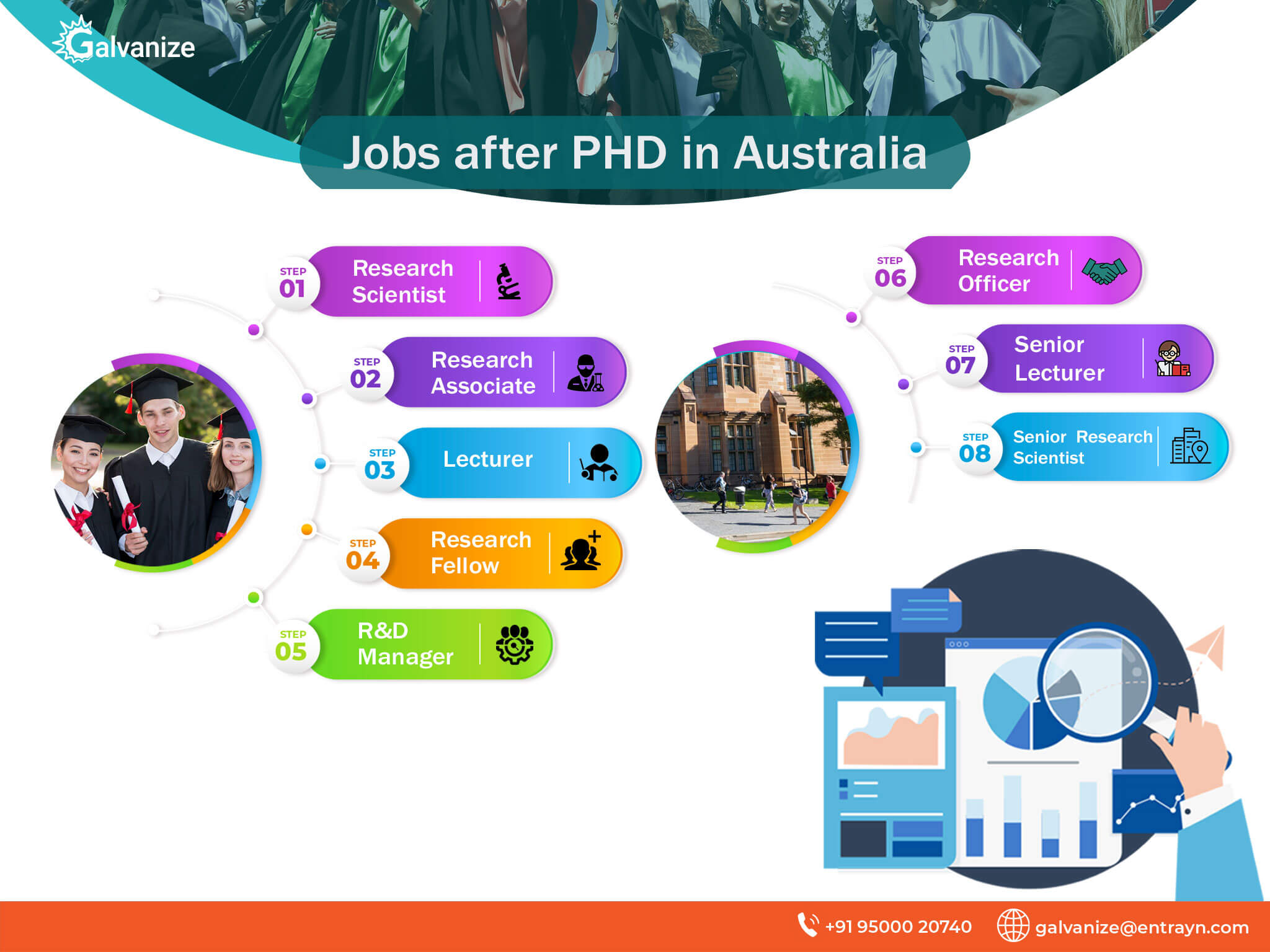
Chapter 1
Overview
Employees who have completed the intensive research coursework that leads to a PhD can be considered experts in their subject. When it comes to flexibility, technical capabilities, and employability, employers evaluate postgraduate research graduates significantly higher than others. Cooperative skills are the only skill category where PhD graduates are rated only marginally lower than undergraduates. The country is a lively hub for research programs, with world-class research facilities and highly renowned universities. A PhD in Australia will allow you to expand your knowledge and abilities, which will improve your prospects of finding jobs in Australia and elsewhere.
Why Study in Australia?
Academic excellence
Without a great higher education system, you can’t be one of the top five most popular study locations in the world, and Australia surely delivers!
Its institutions frequently appear in annual international rankings, demonstrating their high quality and dedication to supporting and welcoming international students.
Academic achievement is offered
You can’t be among the top 5 most popular study destinations in the world without a superb higher education system, and Australia certainly delivers!
Its educational institutions routinely appear in annual global rankings, attesting to their outstanding quality and commitment to assisting and accepting international students.
Fantastic student environment
The support for overseas students is one area where Australia excels. Some cities even have specialized student centres that may assist you with legal issues, job searches, networking, and locating housing, among other things.
You must also know that Melbourne has been named one of the most student-friendly cities on the planet on numerous occasions, which is quite an accomplishment.
Allow your inner explorer to go wild
While Steve Irwin, the well-known “Crocodile Hunter,” died in 2006, his sense of adventure and love for the environment continue on and inspire others. If you have a hidden explorer inside you who only has the opportunity to let loose once in a while, Australia is the place to be!
PhD Degrees
A PhD degree can be obtained if you want to continue your education beyond the undergrad level, or if you want to further your personal development or pursue a career in academia. PhD degrees are postgraduate courses that typically follow a Master’s, MPhil, or MRes degree, though some universities may have additional requirements. Students must conduct independent research on a topic of their choice. You build knowledge and analytical abilities in a single or diverse topic with the support of a supervisor, and you do independent research. The length of a PhD degree varies depending on the country and institution. Sometimes your personal study is accompanied by departmental work, such as presenting seminars or instructing small groups.
PhD students are needed to study on campus under close monitoring, but some universities will allow students enrolled in a part time PhD programme through online education. On-campus education can be full-time or part-time, with the part-time option often lasting twice as long as the full-time option.
PhD Structure
PhD research in Australia is similar to PhD research in the United Kingdom in many aspects. The weather will most likely be a little nicer, and your buddies will most likely be a little envious. However, working on your PhD will be similar to what students in other prominent research destinations go through.
In most cases, an Australian PhD is purely a research degree. Some courses may include teaching modules or training units, although they will be more concerned with professional growth and progression than with formal assessment.
You’ll spend the majority of your time focusing on an independent PhD thesis that makes a significant original contribution to your program’s knowledge. You’ll start with a literature review, which will assess existing scholarship on your topic. Then, depending on your subject, you’ll do your own unique research, evaluating source materials, generating experimental results, or collecting survey results.
You’ll have at least one professional supervisor on hand throughout. This will be an academic with relevant experience in your field. They’ll play an important role in your PhD journey. In reality, supervisors from Australia play an essential role right from the start of the PhD application process.
PhD Programme Length
A full-time PhD in Australia usually takes 3 years. Some individuals take longer than others, although this is mainly due to registration and financial issues.
Part-time PhDs in Australia can run up to 6 years, however international students are rarely offered this option. You must attend full-time in Australia under the terms of your student visa.
PhD Fees
You will pay greater fees as an overseas student in Australia. This is because Australian taxes benefit domestic students by subsidising public universities.
According to the Australian government, median foreign PhD fees range from AUD $18,000 to $42,000 (USD $13,065 to $30,485) per year. If you’re suggesting your own subject or appealing for a project without financing, this is the estimated amount you’ll spend.
Admissions Requirements
In Australia, bachelor’s and master’s degrees in a relevant topic are usually required for admission to a PhD programme. Universities may accept you without a master’s degree, but this is uncommon.
Individual institutions may have different criteria, however you can anticipate to be requested for some or all of the following:
- Evidence of your previous qualifications
- A research proposal
- A personal statement
- Academic, Professional references
Applying for a PhD in Australia
Contacting a potential supervisor should have been the first stage in your Australian PhD application. Generally, the individual you choose should be the principal investigator for a project or research group you want to join, or an academic with research interests linked to the issue you want to propose.
Once you’ve identified a possible supervisor, send them an email. Make sure to give a clear and comprehensive summary of your project or interests, as well as the connection to their research. You can start your formal request to the institution once you have received an indication of interest from a possible supervisor.
PhD in Australia Highlights
| Duration | 3 years |
| Research Universities | 43 |
| Fees | 30,000 AUD – 42,000 AUD |
| Academic Year | February to November |
| Funding Upto | 28,000 AUD per annum |
| Average Salary | 80,000 AUD |
| Work-Study Opportunity | Paid Work up to 40 hours per week |
| Oldest University | University of Sydney (1850) |
Chapter 2
Top Universities for PhD in Australia
The top universities/colleges in Australia for higher ed, as ranked by QS in 2021, are shown below, along with the costs of attaining a PhD.
|
QS 2021 Global Rank |
University |
Fees per Annum (AUD) |
|
31 |
Australian National University |
45,052 |
|
40 |
University of Sydney |
49,000 |
|
41 |
University of Melbourne |
44,128 |
|
44 |
University of New South Wales |
45,600 |
|
46 |
University of Queensland |
40,736 |
|
55 |
Monash University |
34,100 |
|
92 |
University of Western Australia |
34,900 |
|
106 |
University of Adelaide |
45,000 |
|
133 |
University of Technology Sydney |
34,080 |
|
196 |
University of Wollongong |
56,544 |
PhD Fees in Australia for Indian Students
For an Indian student, the cost of pursuing a PhD degree in Australia will range from 16 to 23 LPA.
University |
Fees Per Annum (INR) |
Australian National University |
25,05,412 |
|
University of Sydney |
27,25,859 |
|
University of Melbourne |
24,54.352 |
|
University of New South Wales |
25,36,233 |
|
University of Queensland |
22,65,702 |
|
Monash University |
18,96,904 |
|
University of Western Australia |
19,41,407 |
|
University of Adelaide |
25,03,246 |
|
University of Technology Sydney |
18,95,291 |
|
University of Wollongong |
31,45,038 |
Application Deadlines
In Australia, a PhD can begin at any time during the academic year. This implies that there isn’t usually a fixed application deadline. Universities may prefer that you submit your work before the start of the semester, although this isn’t always the case.
If you’re also seeking financing, such as a scholarship, you may be eligible for an exception. This funding will usually be for a set amount of time, and sponsors may prefer that you begin at the beginning of a school year or term.
Even if there’s not a deadline, keep in mind that your application will take time. As a general guideline, you need to apply at least 4 months prior to the start date of your PhD programme.
Chapter 3
Scholarships to Study PhD in Australia
International students can apply for a huge number of scholarships offered by the Australian government and universities. Additionally, while researching, you can work for 45 hours every week. You should, nevertheless, double-check that any work you do meets the requirements of your PhD.
University |
Scholarship |
Amount Granted (AUD) |
Australian National University (ANU) |
ANU PhD Scholarships |
28,092 per annum |
|
University of New South Wales |
Tuition Fee Scholarship (TFS) |
28,597 per annum |
|
University of Queensland |
Graduate School Scholarship |
28,597 per annum |
|
Monash University |
Maxwell King PhD Scholarship |
35,60 per annum |
|
University of Adelaide |
University of Adelaide Research Scholarships |
28,597 per annum |
|
University of Technology Sydney |
International Research Training Program Scholarship (IRTP) |
Covers the tuition fees |
|
University of Wollongong |
PhD Scholarship Opportunity as per Faculty |
28,092 per annum |
Chapter 4
Jobs after PhD in Australia
In addition to the academic research prospects, there are considerable job chances for overseas students in Australia for PhDs to work with young, global start-ups and innovative high-growth enterprises. According to emolument, the average pay offered after completing a doctorate in Australia is 80,000 AUD. Here is a list of jobs which you can go for after completing a PhD degree in Australia.
#1. Research Scientist
Average Salary: AUD 94,000 annually
Research scientists are in charge of planning, carrying out, and analysing data from laboratory-based research, tests, and experiments. Research scientists work in nearly every field in science. They design and conduct experiments and research in a variety of fields, including geoscience, clinical science, meteorology, and pharmaceuticals. A research scientist will most certainly be focusing on a much more specialised issue, such as gravity waves or stem cell biology, in these wide study areas.
#2. Research Associate
Average Salary: AUD 83,000 annually
A research associate often works in an investment company or investment management business’s research department, providing useful data to the company’s decision-makers who trade assets. A research associate can organize, coordinate, and perform research on sectors, industries, companies, markets, different investment tools, and economics.
#3. Lecturer
Average Salary: AUD 87,000 annually
Lecturers are subject matter experts who develop course materials, lesson plans, and curricula, as well as perform research and fieldwork, interact with students, aid with application processes, and attend conferences, seminars, and meetings.
#4. Research Fellow
Average Salary: AUD 92,000 annually
Academic scholars in a university or research centre are known as Research Fellows. A Research Fellow can work alone or as part of a research group. Research Fellows have outstanding research and qualitative skills, as well as a solid academic background that includes peer-reviewed magazine and conference paper publications.
#5. R&D Manager
Average Salary: AUD 133,000 annually
The R&D Manager is in charge of development of new products and collaborates with the marketing team to bring these goods to market. This comprises leading and supervising the R&D Team, which includes dividing workload and maintaining performance and productivity levels.
#6. Research Officer
Average Salary: AUD 77,000 annually
A Research Officer is in charge of overseeing research projects in order to achieve certain goals. They are responsible for determining research objectives, developing techniques, and generating funds for the organisation for which they work. To develop study aims and test criteria, researchers frequently collaborate with a group of other researchers and boards. They also define research methodology, variables, data collection strategies, and methods of data analysis.
#7. Senior Lecturer
Average Salary: AUD 125,000 annually
Senior lecturers are people with substantial training, skill, and experience in their area of study who hold a high-ranking teaching post. Senior lecturers split their time between class hours, preparation for teaching, and briefings with students. If the employment is based in a higher education institution, it may also include certain research tasks, such as presenting research results at conferences throughout the world.
#8. Senior Research Scientist
Average Salary: AUD 109,000 annually
Senior research scientists operate mostly in laboratories, conducting research and experiments for educational, industrial, and commercial purposes. They could, for example, assist in the development of new goods for their company or add to scientific knowledge in their profession.
Cost of Living in Australia
In Australia, the travel costs and lodging is reasonable. Sydney is 18% less expensive than London and 28% less expensive than New York City. The cost of living in Australia varies from 2800 to 3100 AUD per month.
|
Items |
Monthly Cost (AUD) |
|
Accommodation |
1000 |
|
Groceries and Eating out |
80 - 280 |
|
Gas and Electricity |
25 - 100 |
|
Phone and Internet |
14 - 40 |
|
Public Transport |
11 - 40 |
|
Car |
108 - 187 |
|
Entertainment |
57 - 108 |
FAQs
How long does it take to complete a PhD in Australia?
Ans: Students are required to finish their degree requirements in 3 years, with the option to extend this time to a maximum of 4 years.
How can I locate and contact a tutor in Australia to pursue a PhD?
Ans: It is strongly advised that you contact a possible supervisor to explore how your research interests might be consistent with theirs and their experience. If distance allows, set up a meeting or a phone call with them to explore your intended PhD and their research areas.
What is the average cost of a doctoral degree in Australia?
Ans: The cost of acquiring a PhD varies, not just because each university charges differently, but also because there are a variety of assistantships available. In Australia, a Ph.D. costs roughly 30,000 AUD to 42,000 AUD each year.
Conclusion:
Foreign students have a rich history of being welcomed and assisted by Australian institutions as they acclimate to a new academic system. Universities assist students with housing arrangements, host special student orientation weeks, and offer a variety of additional student services all year.
In Australia, a university degree is mostly problem-based, assisting you in becoming a self-directed learner. Passing a midterm or final test is frequently required to successfully complete a course. In most college courses, you have a lot of freedom in terms of how much work you put in and how you handle learning.
Written by Madhurjya Chowdhury
Guided by Pavitra Srinivasan and the Galvanize In-house Experts













